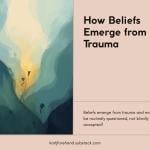Recently, someone stumbled upon my blog while googling this question:
is the unforgivable sin abortion?
I’d forgotten all about worrying about the unforgivable sin. For years, I was filled with anxiety that I might have accidentally “blasphemed the Holy Spirit” by saying something disrespectful, taking communion unworthily, harboring anger against my father, preferring outdoor activities to worship services, etc. There seemed to be infinite ways to blaspheme the Holy Spirit. Why did blasphemy have to be so ambiguous?
My church claimed that the only unforgivable sin was failure to repent. This, of course, only temporarily assuaged the fear and guilt. Time after time, I repented. Time after time, I felt false. I was repenting for all the same things every day! Not cheerfully obeying my mother. Not honoring or loving my father. Not accepting rebuke with a joyful heart. Not pining for the next church service. I began to wonder if I had been really repenting at all.
My pastor used to say that apology meant saying “I’m sorry” and then continuing to walk in the same direction. Repentance, however, meant saying “I’m sorry” and turning around. I used this yardstick to judge myself weekly for failing to turn around and stop committing the same sins (which were often as simple as failing to eradicate a crush on a boy through sheer force of will).
Suffice to say that the unforgivable sin was always on my mind. Not just my mind, either, judging by the number of Christian websites that feature elaborate answers and reassurances to the question. In 1954, William Branham preached a whole sermon about it. It seems that evangelical-fundamentalist Christianity fosters an obsession with the unforgivable sin, because avoiding sin is the hub around which the religion turns. The striving and vigilance are yet another thing fundamentalism takes to a perverse extreme. It’s good to be self-aware, to reflect on your actions and consider whether or not they are hurting anyone. It’s good to consider whether they damage your relationship with God, if you have one. It’s not good to focus so obsessively on eradicating sins that your religion becomes Antisinianity, a religion of negatives, rather than a positive force getting your heart in the right place.
As for my reader’s question, the answer is simple: No.
Unless you believe in a God who only refuses to forgive people with uteri. In which case, I dare you to assert that a God like that is somehow still just.
















